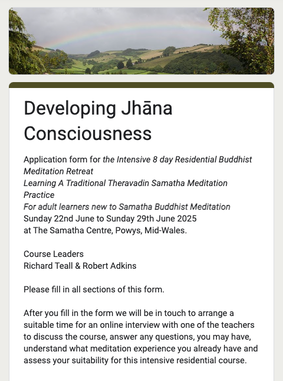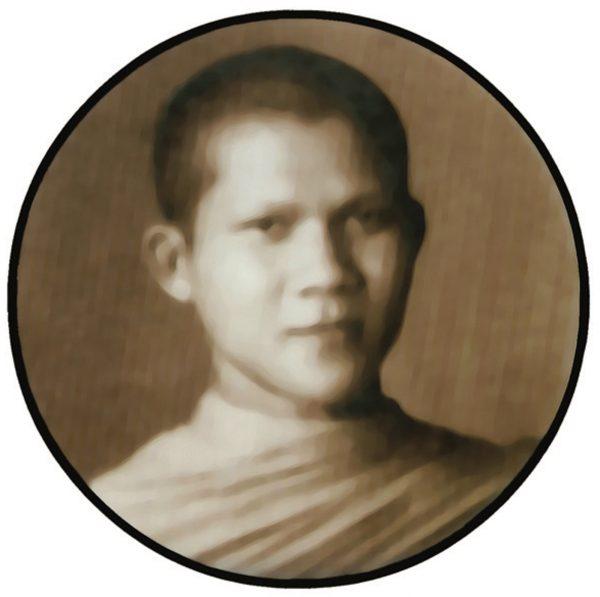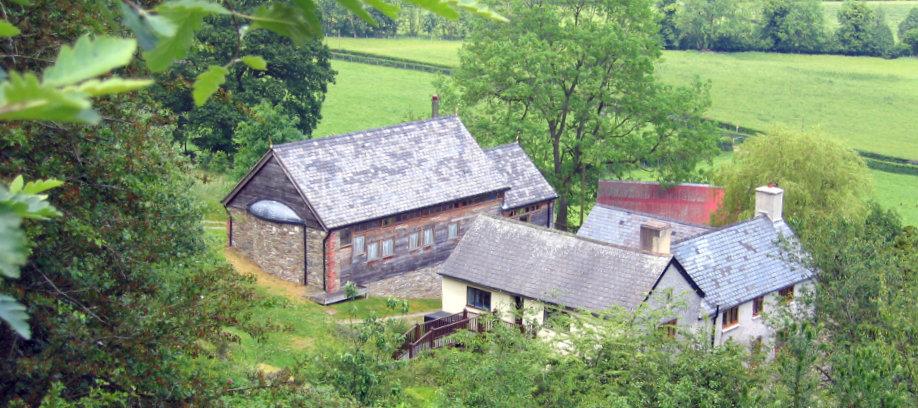Developing Jhāna
Consciousness
10 day residential retreat
Friday 28th August to
Sunday 6th September 2026
This course is perfect for those who are keen to experience a traditional way of developing Buddhist jhāna.
It’s suitable for newcomers to Samatha Buddhist meditation.
It’s also a good fit for anyone with experience in other forms of meditation.
Samatha breathing mindfulness
Samatha breathing mindfulness meditation (ānapānasati) made its way to England in 1962, thanks to Nai Boonman, a Thai meditation teacher. You can find more about this in Wendy Biddlecombe's Fall ’22 edition of Tricycle Magazine, titled ‘The Jhāna Underground’.
This retreat provides a well-organised introduction to this Samatha breathing mindfulness technique. You’ll be learning from two highly experienced meditation teachers. While silence will be the norm, there will be time for sharing experences and discussion.
Daily group meetings will be held, where you’ll gradually learn and practice different stages of the meditation. There will also be time for individual practice, including both sitting and walking meditation.
Daily one-to-one consultations with one of the two experienced teachers - both of whom have over 40 years of meditation experience - are a unique feature of the course.
Practical Arrangements
Life at the Centre is run in a way that supports meditative practice. Residents abstain from sexual activity, alcohol and recreational drugs. Reading, too, is generally a distraction. The use of mobile phones and other electronic media devices is discouraged.
Meals are prepared and eaten communally. All participants help in the kitchen working mindfully to provide meals, wash up. Participants are also work together on small tasks such as cleaning personal and communal spaces at the end of the course.
Meditators will have their own room. Bathrooms and toilets are shared. Duvets and pillows are provided. It’s helpful if meditators bring their own bed linen.
Cost - The Samatha Trust relies entirely on donations from course participants, members and friends. The teachers leading the course give their time freely. The teaching is freely given, teachers receive no payment or remuneration of any kind. Your donation towards cost of food and the upkeep and development of the centre are very welcome.
Mental Health Safeguards
While Samatha meditation is helpful for most people, a weekend or week-long retreat might not be the best fit if you are dealing with significant mental health challenges, especially if you are new to the practice.
Before you can join the course, you will meet with one of the course tutors to chat about your meditation experiences and what you need.
These courses are quite intense, and they can bring up any thoughts or feelings you might have that you haven’t dealt with yet. If they are strong, they might be tough to handle during the course. It might be better to start meditating or practising mindfulness in a place where you can actively engage your mind and have easy access to your usual support. There are also many mindfulness-based therapies that are now more accessible.
Remember, meditation is not a replacement for psychiatric treatment, so if you have significant psychiatric disorders, it is important to approach meditation practice carefully and let the teacher know about your condition before you start.
While Samatha meditation is helpful for most people, a weekend or week-long retreat might not be the best fit if you are dealing with significant mental health challenges, especially if you are new to the practice.
Before you can join the course, you will meet with one of the course tutors to chat about your meditation experiences and what you need.
These courses are quite intense, and they can bring up any thoughts or feelings you might have that you haven’t dealt with yet. If they are strong, they might be tough to handle during the course. It might be better to start meditating or practising mindfulness in a place where you can actively engage your mind and have easy access to your usual support. There are also many mindfulness-based therapies that are now more accessible.
Remember, meditation is not a replacement for psychiatric treatment, so if you have significant psychiatric disorders, it is important to approach meditation practice carefully and let the teacher know about your condition before you start.
The Samatha Centre: Greenstreete
The course takes place at the National Samatha Centre, Greenstreete in Mid-wales.
The national Samatha Centre at Greenstreete, Llangullo, is a converted farmhouse with individual accommodation, forest meditation huts and a purpose built shrine hall. There are regular courses for beginners and experienced meditators.
The house has been extensively renovated; a Meditation Hall has been constructed on the site of an old barn and six meditation huts built for those who would benefit from more solitude.
Gardens, woodland and a wetland area have been cultivated in collaboration with the local wildlife trust. The farmhouse and Meditation Hall are surrounded by 88 acres of hills, woodland and streams, providing varied and peaceful settings for meditation.
If you feel ready to commit to this intensive course
Apply through the online form by clicking the link below
If you can’t access the form or have any questions, email
developing-jhana-consciousness@samatha.org

All appicants will meet with one of the course teachers before being accepted on the course.



